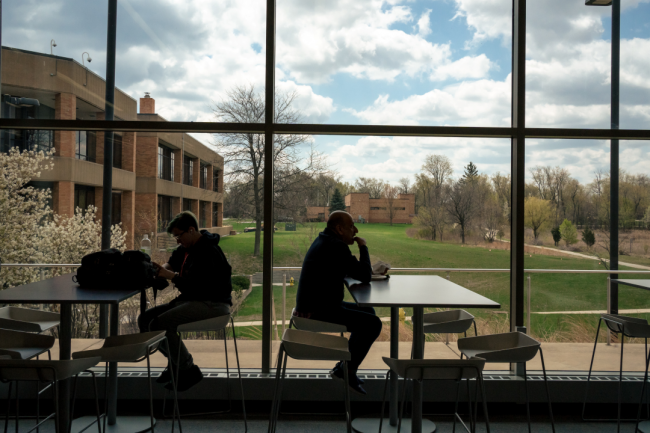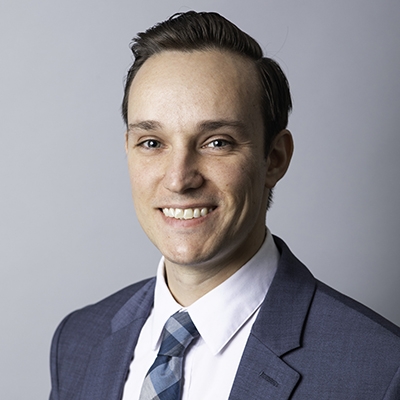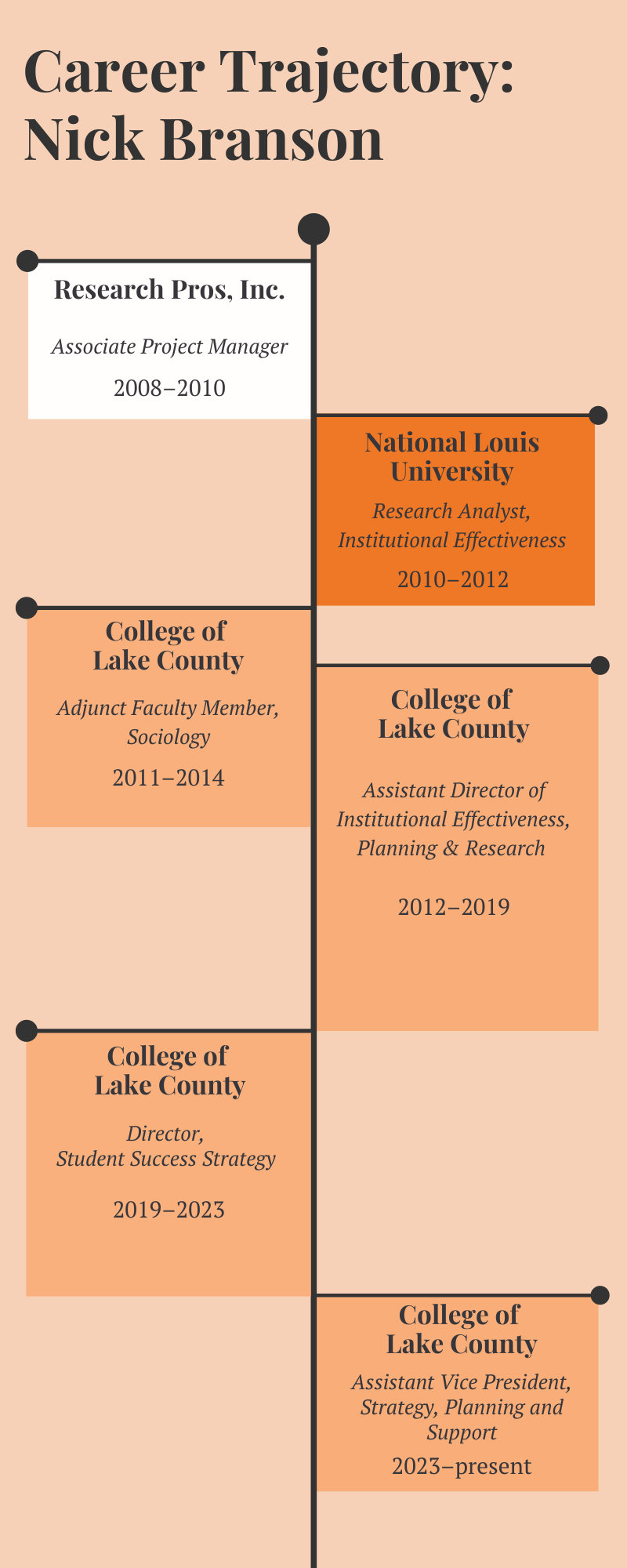You have /5 articles left.
Sign up for a free account or log in.

College of Lake County staff and administrators work to create access for learners of all kinds.
College of Lake County
Creating access to higher education is a key aspect in Nick Branson’s work, his ideas of student success and how he bridges academic and student affairs for holistic success.

College of Lake County
As the inaugural assistant vice president of strategy, planning and success at the College of Lake County in Illinois, Branson spoke with Inside Higher Ed about his unique background and how it informs his work in student success and institutional planning.
Q: How did your career lead you to working at College of Lake County, where you’ve been for the past 12 years?
A: I actually began in my current institution as an adjunct faculty member in the sociology department. I had been working full-time in institutional effectiveness at National Louis University in the Chicago area. I was enjoying doing a lot of that research work and helping National Louis University inform how to improve access for students … But I had missed the direct connection with students.
I love working with students directly and teaching and just loved the mission of [College of Lake County]. As an open-access community college, [it] really spoke to my personal purpose in helping students achieve their goals and having that access to be successful.
One day, I was meeting with the department chair of the sociology department, [and] she said, “I think that thing you do during the day, that other job you have—there’s a job opening here at College of Lake County where you could do that, too.”
And sure enough, there was an assistant director of institutional effectiveness planning and research position that I applied for and was really fortunate to have that role. I spent several years in that position, doing a variety of work in the research space and helping colleagues think about continuous improvement to improve the student experience and how to make our students the most successful that they could be. I continued teaching for a little bit on the side still, while doing that, so a little bit [of] overlap there. And then organically fell into a different role more directly in the student success space.
I was serving as the institutional effectiveness representative on a number of different teams around the institution. And at the time, in 2018, we also had a new president enter College of Lake County. She has a laser focus on student success. We needed to reposition and refocus our attention on helping our students succeed and improve what we were doing, but we didn’t have anyone at the time to coordinate that work and lead that effort.
So I was asked to do a reassignment from my role to serve as the lead in student success—we call that student success strategy—to connect all of these pieces that were happening across the institution, and align them really strategically to have the best impact on our students.
I did that reassignment for a year, and the college then created a permanent position in the director of student success strategies, so I applied for that role and was fortunate to get that job and then have spent the last three years in that position, really coordinating our institutional work to improve the experience for students.
Just very recently, in March of 2023, we’ve been recognizing the need to strongly connect our evidence to actually decide what will improve that student experience, and then make sure that we’re assessing that. I was promoted to a new role as the assistant vice president of strategy, planning and support, which is the unit that I’m in and now oversee both our student success strategy area, and our institutional effectiveness planning and research area.
Q: How has your background in institutional effectiveness and sociology impacted your work now?
A: Oftentimes, [when] people think of student success, they think of student affairs or student development or academic affairs. I think the benefit of having the institutional effectiveness background is, I’ve really gotten to know both of those spaces and folks around the institution.
When you’re working on data, you end up informing a lot of decisions in all of those different spaces, and you get to know a lot of different people. That evidence piece has really served well in being very intentional in our student success work and knowing where we should focus our attention—and for which students, especially, but then also, it’s that relationship piece. So having not been in a very siloed function of the organization [has] been beneficial to getting people to collaborate together and come together for the benefit of our students in our work.

And then, my sociology background, that’s been really helpful to tie especially to the why of our institution. As a community college, we seek to serve our community, and that sociology background really helps you articulate that and understanding the bigger picture system and role that the college plays in the local community, and some of the economic and social trends that we try to address through education to improve our community.
I think this role, and even the position I’ve had prior to this as a dedicated student success strategy role, is somewhat unique in higher ed, especially given my background in institutional effectiveness. I do think it’s served really well, for me, personally, the background experience to inform where we focus our attention to improve things for students.
Q: What is your philosophy for student success?
A: When I think about student success, I think about it meaning: a student achieving whatever their goal might be, and learning along the way.
Students have a variety of goals, particularly at community colleges. Sometimes it’s completing a credential; sometimes it’s just taking a few courses to get a promotion or to learn something. Sometimes their goal is finding a job and the credential is somewhat meaningful to them, but maybe not as much. Understanding that there’s a diversity of different goals is critical, and I think it’s also important to understand the diversity of students that we’re serving, and they’re not all on the same playing field.
As educators, it’s not our job to determine who’s worthy of an education—everyone’s worthy of an education. It’s our job to determine, how do we understand the diversity of those that we’re trying to serve and their experiences, and include them, regardless of where they’re coming from and where they’ve started? And do that equitably, so that they’re able to get all of the support they need to be successful to achieve whatever that goal is that they have in mind.
I think there’s a key intersection of access and success. A lot of times we talk about success as the outcome—the completion, the graduation rate, those types of metrics—but you really do need to think about access, too, because if you don’t have access to the opportunities that you need, the resources that you need, it’s really very difficult to reach that success point and reach that goal, whatever it is for the students.
From a sociology background, I really think you can impact student success and access both at the individual micro level, but also organizationally. That individual level—the interaction with faculty and staff and students, the service we provide, and the way we provide that in a positive way—has to be there for students to have the access and the success that they want. But you could have the best service in the world, [and] if your process and policy and system are not designed well, that structural piece, if that’s not really there to facilitate the experience for students, they’re not likely to be successful. You really have to think about both.
Q: What are your goals in your first year in this inaugural role?
A: A couple of goals for this first year in this role are really to align our data. We’re using evidence to inform our decisions really strategically with our student success efforts. We’ve always done a fair job of using data to decide what to focus on and then to assess how that’s going, but we definitely have opportunity to improve in that area and to get much more intentional about what next step we are taking.
We’ve tended to have a bit of data and then go and work on that and do some different efforts there. But now it’s time to really disaggregate that data carefully. Not that we haven’t done that before … but look at that much more carefully and talk about what students are being served well and not served well by these improvement efforts that we've had. Have we really improved the experience for all of our students or just some of our students? Aligning those two pieces, I think, is really key.
Another goal I have is to get better about communicating our data. Oftentimes, we have a lot of data, we have all these different data sources, there’s a tremendous amount of things to look at. We’ve got lots of different outcome metrics for students, and at the same time, we don’t really talk about, “How does that get communicated in a meaningful way so that people who are actually responsible for working with students can make informed decisions?” We just say, “Here’s a bunch of data—make some good decisions with it.” But communicating it in a meaningful way is essential in my mind. What I studied as part of my doctoral program and dissertation [is that] when you communicate data well, people are much more likely to understand what it actually means, and to actually use it and feel motivated to use that evidence.
Another key piece of this role that I’m working hard to establish and then have sustained longer term is around institutionally planning. Of course, our focus on student success means that that is always a core foundation of any of our planning work. But like any institution, going through lots of organizational change and trying to continuously improve, it really takes careful planning to think about what should we change, and in what order and at what pace.
We haven’t always been able to do that very well, and I think a lot of institutions struggle with that, because change is really hard, just on the surface, but then to plan it out really well, is an added challenge. This role will serve as a key resource to help with that planning and to identify, what’s the most important thing that we could do right now, for the right reasons, and be really careful about which changes we do so that we’re not burning people out.
Seeking stories from campus leaders, faculty members and staff for our Student Success focus. Share here.




